Engage your mind and calm your anxiety with these brain-teasing hobbies. Try jigsaw puzzles for a meditative experience, or challenge yourself with crosswords and Sudoku. Rubik's Cube solving can enhance your spatial awareness, while chess sharpens strategic thinking. Tackle mind-bending riddles and logic puzzles to boost problem-solving skills. Memory games and word searches offer soothing distractions from daily stressors. These activities not only provide a focused escape but also improve cognitive function and promote relaxation. With options ranging from simple to complex, you'll find the perfect mental workout to ease your anxious mind. Discover how these engaging pastimes can transform your daily routine.
Jigsaw Puzzles
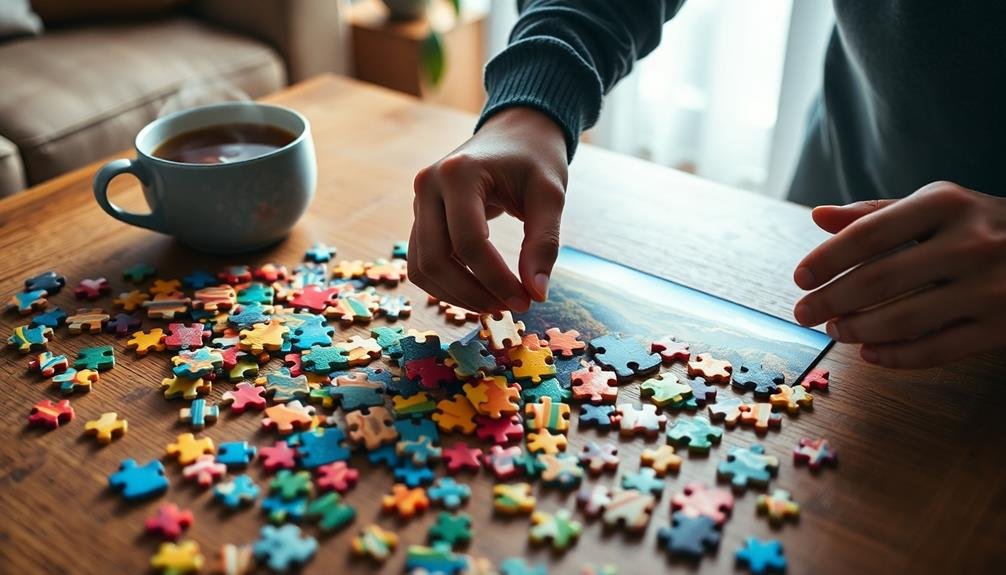
Puzzle enthusiasts have long known the calming effects of jigsaw puzzles. As you engage in this hobby, you'll find your anxious thoughts melting away, replaced by a focused concentration on fitting pieces together. The act of searching for specific shapes and colors can be meditative, allowing your mind to temporarily escape from worries and stress.
You'll experience a sense of accomplishment with each piece you connect, boosting your mood and self-esteem. Jigsaw puzzles also improve your cognitive function, enhancing problem-solving skills and spatial awareness. They're an excellent way to practice patience and persistence, traits that can help manage anxiety in daily life.
Choose puzzles with images that resonate with you, whether it's a serene landscape or a vibrant work of art. Start with smaller puzzles and gradually increase the difficulty as your skills improve.
You can puzzle alone for solitary relaxation or invite friends and family to join, creating a calming social activity. Consider framing completed puzzles as a reminder of your achievements and the peaceful moments spent assembling them.
Embrace this hobby as a tool to quiet your mind and find tranquility amidst life's challenges.
Crossword Challenges
Often overlooked as a powerful anxiety-reducer, crossword puzzles offer a unique blend of mental stimulation and relaxation. As you focus on deciphering clues and filling in the grid, your mind shifts away from anxious thoughts, providing a much-needed respite.
You'll find that the act of solving these word puzzles engages multiple cognitive functions, including vocabulary recall, problem-solving, and pattern recognition.
To get started with crossword challenges, you don't need much:
- A puzzle book or newspaper
- A pencil (for easy corrections)
- A comfortable, quiet space
- A few minutes of uninterrupted time
Begin with easier puzzles and gradually work your way up to more challenging ones. You'll notice improvements in your solving skills over time, boosting your confidence and sense of accomplishment.
Don't be discouraged if you can't complete a puzzle in one sitting; it's perfectly fine to return to it later. The beauty of crosswords lies in their ability to occupy your mind without overwhelming it, making them an ideal hobby for managing anxiety and promoting mental well-being.
Sudoku Mastery
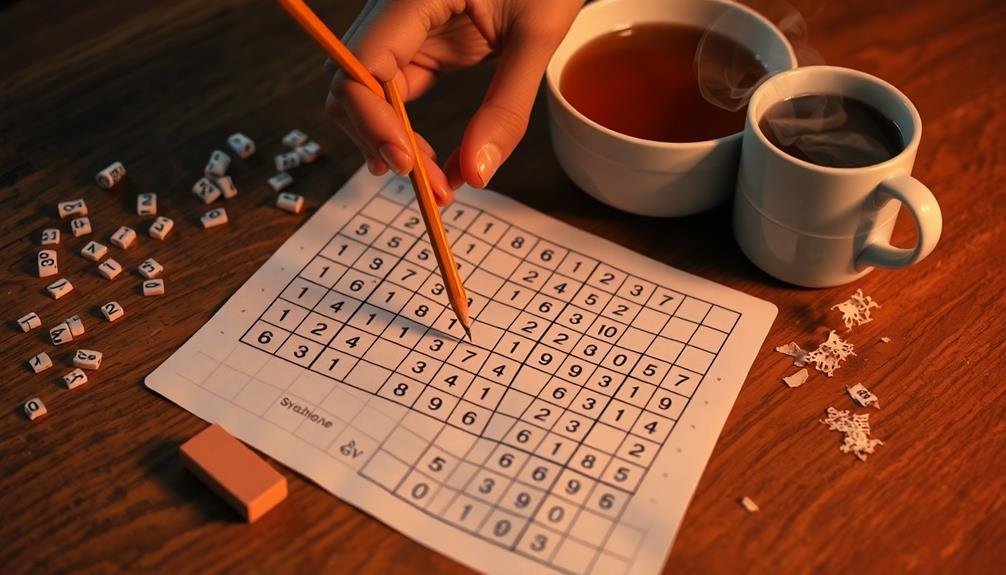
Numbers dance across the grid as you explore the world of Sudoku mastery. This Japanese logic puzzle offers a fascinating challenge that'll keep your mind focused and anxiety at bay. As you fill in the 9×9 grid with digits from 1 to 9, you'll find yourself immersed in a world of patterns and possibilities.
Start with easier puzzles and gradually work your way up to more difficult ones. You'll develop strategies like scanning rows, columns, and 3×3 boxes for missing numbers. Look for single candidates and hidden pairs to eliminate options and narrow down solutions.
As you progress, you'll learn advanced techniques like X-Wing and Swordfish. Sudoku's beauty lies in its logical nature – there's always a solution waiting to be uncovered. This certainty can be comforting when anxiety clouds your thoughts.
The puzzle's structure provides a sense of order and control, allowing you to channel your energy into problem-solving rather than worrying. Regular practice will sharpen your cognitive skills, improve your concentration, and boost your confidence.
You'll find satisfaction in completing each puzzle, no matter how challenging. Embrace Sudoku mastery as a calming hobby that exercises your mind and soothes your soul.
Rubik's Cube Solving
From the moment you pick up a scrambled Rubik's Cube, you're transported into a world of colorful complexity. This iconic puzzle, invented in 1974 by Hungarian sculptor Ernő Rubik, has captivated millions worldwide. As you twist and turn the cube, you'll find your anxious thoughts fading away, replaced by focused concentration.
Learning to solve the Rubik's Cube isn't just about memorizing algorithms; it's about developing problem-solving skills and spatial awareness. You'll discover various methods, from beginner-friendly layer-by-layer approaches to advanced speedcubing techniques.
As you practice, you'll notice improvements in your:
- Hand-eye coordination
- Pattern recognition
- Memory retention
- Patience and perseverance
The satisfaction of finally solving the cube is unparalleled. You'll feel a surge of accomplishment as the colors align, creating perfect faces.
But the journey doesn't end there. You can challenge yourself to solve it faster, learn new methods, or even immerse yourself in different cube variations like 4×4 or 5×5. Rubik's Cube solving offers a lifetime of mental stimulation and a soothing escape from anxiety.
Chess Strategy
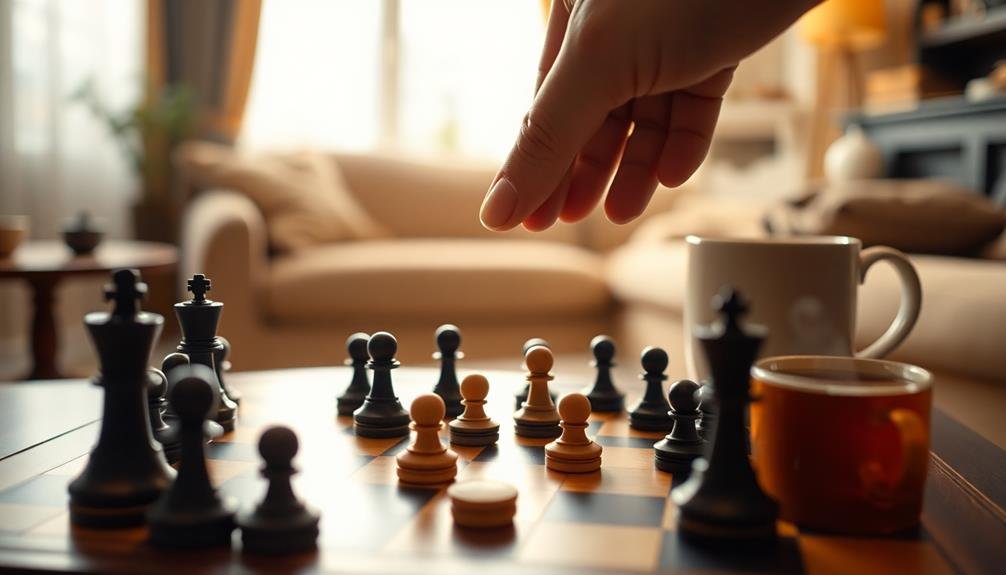
Every chess game unfolds like a silent battle of wits. As you investigate chess strategy, you'll discover a world of intricate planning and calculated moves.
Begin by mastering the basic principles: control the center, develop your pieces quickly, and protect your king. These fundamentals will serve as your foundation for more advanced tactics.
Next, focus on improving your positional play. Learn to evaluate the strengths and weaknesses of different pawn structures, and understand how to exploit your opponent's weaknesses while minimizing your own.
Study common endgame scenarios to sharpen your ability to convert advantages into victories.
Don't neglect the psychological aspects of chess. Develop patience and composure, as these qualities will help you make better decisions under pressure.
Practice analyzing your games afterward to identify mistakes and missed opportunities.
As you progress, explore various opening systems to expand your repertoire. However, remember that understanding the underlying principles is more important than memorizing specific move sequences.
Chess strategy isn't just about winning; it's about cultivating a calm, analytical mindset that can benefit you in many aspects of life.
Origami Folding
Origami, the Japanese art of paper folding, offers a unique blend of creativity and precision that can be incredibly soothing for anxious minds. As you explore this hobby, you'll find yourself focusing intently on each fold, temporarily pushing aside worries and stress.
The repetitive nature of origami movements can induce a meditative state, promoting relaxation and mindfulness.
To get started, you'll need only a few basic supplies:
- Origami paper (or any square paper)
- A flat surface
- Patience
- Your hands
Begin with simple designs like cranes or butterflies, gradually progressing to more complex models as your skills improve. You'll discover that origami isn't just about creating beautiful objects; it's a journey of self-discovery and personal growth.
The process of transforming a flat sheet into a three-dimensional figure can be deeply satisfying, boosting your self-esteem and sense of accomplishment.
As you practice origami, you'll develop better hand-eye coordination, spatial awareness, and problem-solving skills. These benefits extend beyond the hobby itself, potentially improving your performance in other areas of life and helping to manage anxiety more effectively.
Mind-Bending Riddles

For those who enjoy mental gymnastics, mind-bending riddles offer an engaging way to challenge your brain and alleviate anxiety. When you're focused on solving a complex puzzle, your mind shifts away from worries, providing a much-needed mental break.
Riddles come in various forms, from classic word puzzles to logic-based brainteasers. You'll find that as you practice, your problem-solving skills improve, boosting your confidence and reducing stress. Start with simpler riddles and gradually work your way up to more challenging ones.
Here's a quick guide to different types of riddles and their benefits:
| Riddle Type | Difficulty | Benefits |
|---|---|---|
| Word Play | Easy | Enhances vocabulary |
| Logic | Medium | Improves reasoning |
| Math | Hard | Sharpens numerical skills |
| Visual | Varies | Boosts spatial awareness |
| Lateral | Challenging | Encourages creative thinking |
To get started, try solving one riddle a day. You can find collections online, in books, or through mobile apps. Don't be discouraged if you can't solve them immediately – the process of thinking through the problem is what counts. Remember, the goal is to enjoy the mental challenge and give your anxious mind a constructive focus.
Logic Puzzles
Logic puzzles come in various forms, including Sudoku, crosswords, and lateral thinking challenges.
You'll find these mental exercises can help reduce anxiety by focusing your mind on problem-solving rather than worry.
As you engage with logic puzzles, you're likely to experience improved cognitive function and a sense of accomplishment, both of which can contribute to a calmer state of mind.
Types of Logic Puzzles
Puzzle enthusiasts often find solace in the world of logic puzzles. These brain-teasers come in various forms, each challenging your analytical skills in unique ways. Sudoku, perhaps the most well-known type, requires you to fill a 9×9 grid with numbers following specific rules. It's a great exercise in deductive reasoning and pattern recognition.
Crosswords are another popular choice, testing your vocabulary and general knowledge. You'll find yourself searching for the perfect word to fit intersecting clues, often learning new facts along the way. For those who prefer visual puzzles, jigsaw puzzles offer a tactile experience as you piece together an image.
If you're looking for more diverse options, consider these types of logic puzzles:
- Cryptograms: Decode secret messages by substituting letters
- Nonograms: Create pixel art by following number clues
- Kakuro: Solve number crosswords using addition
- Logic grid puzzles: Use clues to deduce relationships between items
Each type of logic puzzle offers a unique mental workout, helping you focus your thoughts and calm your anxious mind. By engaging in these puzzles regularly, you'll improve your problem-solving skills while finding a peaceful escape from daily stressors.
Benefits for Anxiety
Engaging in logic puzzles offers numerous benefits for those struggling with anxiety. When you immerse yourself in these brain teasers, you'll find your mind shifting focus from worry to problem-solving. This redirection can provide a much-needed respite from anxious thoughts, allowing your brain to reset and relax.
As you work through puzzles, you're training your mind to approach challenges methodically. This skill can transfer to real-life situations, helping you tackle anxiety-inducing problems with a calmer, more rational approach. You'll also experience a sense of accomplishment with each solved puzzle, boosting your confidence and self-esteem.
Logic puzzles often require sustained concentration, which can serve as a form of mindfulness. This focused attention anchors you in the present moment, reducing rumination on past or future concerns. Additionally, the repetitive nature of some puzzles can have a meditative effect, further promoting relaxation.
Regular engagement with logic puzzles can improve your overall cognitive function, enhancing memory, reasoning, and decision-making skills. These improvements can lead to increased mental resilience, making you better equipped to handle stress and anxiety in your daily life.
Memory Games
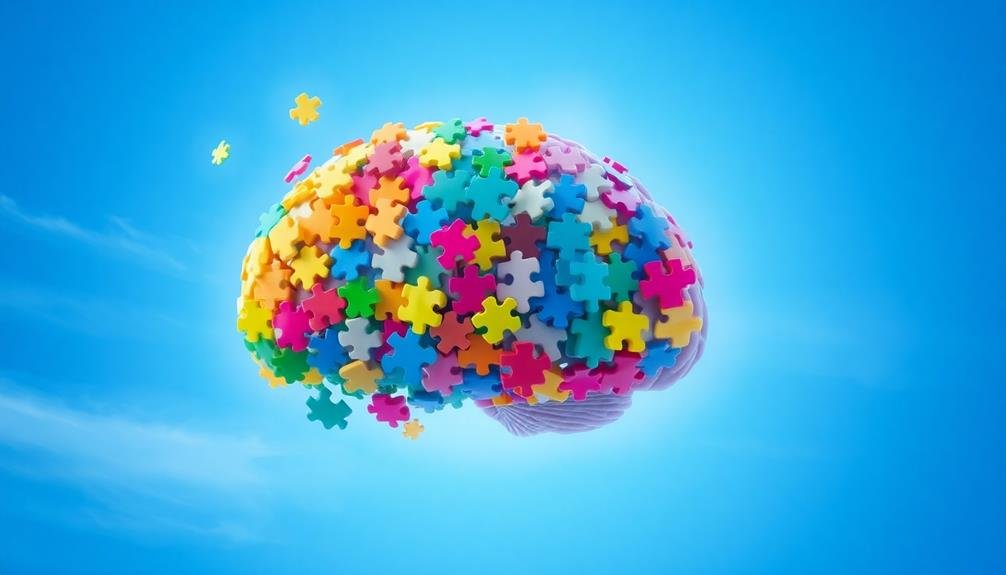
Memory games offer a fun and effective way to engage your mind and reduce anxiety. By focusing your attention on recalling information, you'll divert your thoughts from worry-inducing topics. These games can range from simple card-matching exercises to complex digital puzzles, catering to various skill levels and preferences.
As you challenge yourself with memory games, you'll notice improvements in cognitive function and concentration. This mental exercise can help calm your anxious mind by providing a sense of accomplishment and control. Regular practice may even boost your overall memory capacity, potentially reducing stress in daily life.
Consider trying these popular memory games:
- Concentration (card-matching game)
- Simon (electronic sequence game)
- Lumosity (brain-training app)
- N-back tasks (working memory exercises)
To maximize the anxiety-reducing benefits of memory games, set aside dedicated time for practice. Start with shorter sessions and gradually increase duration as your skills improve.
You'll find that the more you engage in these activities, the more your mind stays occupied with positive challenges rather than anxious thoughts. Remember, consistency is key in developing this calming hobby and reaping its mental health benefits.
Word Search Adventures
Word search's classic appeal takes on new life as an anxiety-reducing hobby. You'll find that these puzzles offer a soothing escape from daily stressors while engaging your mind in a focused task. As you scan the grid for hidden words, you're training your brain to concentrate on a single objective, effectively pushing anxious thoughts aside.
To maximize the calming effects, try themed word searches that align with your interests. Whether you're passionate about travel, cuisine, or literature, there's a puzzle tailored to your preferences. You can also challenge yourself with multilingual word searches, improving your vocabulary while relaxing.
Don't limit yourself to paper puzzles; digital word search apps offer additional benefits. They're portable, often free, and provide instant gratification with immediate feedback. Some apps even include timed challenges, adding an element of excitement without inducing stress.
For a more immersive experience, consider creating your own word searches. This creative process allows you to personalize your relaxation time while exercising your organizational skills.
You'll find that crafting puzzles can be just as calming as solving them, offering a dual approach to anxiety management.
Frequently Asked Questions
How Do Brain-Teasing Hobbies Affect Sleep Patterns?
Brain-teasing hobbies can impact your sleep patterns. They'll stimulate your mind, potentially making it harder to wind down before bed. However, if you engage in them earlier in the day, they might help tire out your brain, improving sleep quality.
Can These Hobbies Improve Cognitive Function in Older Adults?
Yes, these hobbies can boost your cognitive function as you age. They'll challenge your mind, improve problem-solving skills, and enhance memory. You'll find that regularly engaging in brain teasers keeps your mind sharp and agile.
Are There Any Potential Negative Effects of Engaging in Brain Teasers Excessively?
Yes, there can be negative effects if you overdo brain teasers. You might experience mental fatigue, stress, or neglect other important activities. It's essential to maintain a balance and not become obsessed with cognitive challenges.
How Long Should One Spend on Brain Teasers for Optimal Anxiety Reduction?
You'll want to spend about 15-30 minutes on brain teasers daily for ideal anxiety reduction. Don't overdo it, as excessive puzzling can become stressful. Listen to your body and stop when you feel your mind calming down.
Are Digital Versions of Brain Teasers as Effective as Physical Ones?
You'll find digital and physical brain teasers can be equally effective. It's more about your personal preference and engagement level. If you're comfortable with digital platforms, they offer convenience and variety. Choose what works best for you.
In Summary
You've now discovered a variety of brain-teasing hobbies to help calm your anxious mind. Whether you're piecing together jigsaw puzzles or solving complex chess strategies, these activities will engage your brain and provide a welcome distraction. Don't hesitate to try them all and find your favorites. Remember, it's not just about solving the puzzle; it's about the journey of focus and relaxation. So pick up a challenge, immerse yourself, and let your worries melt away as you exercise your mind.

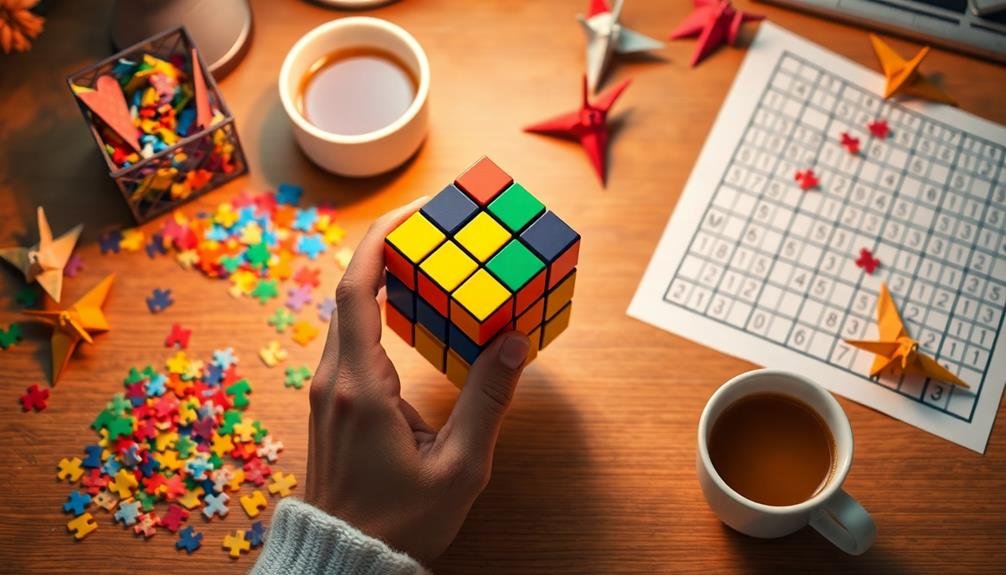
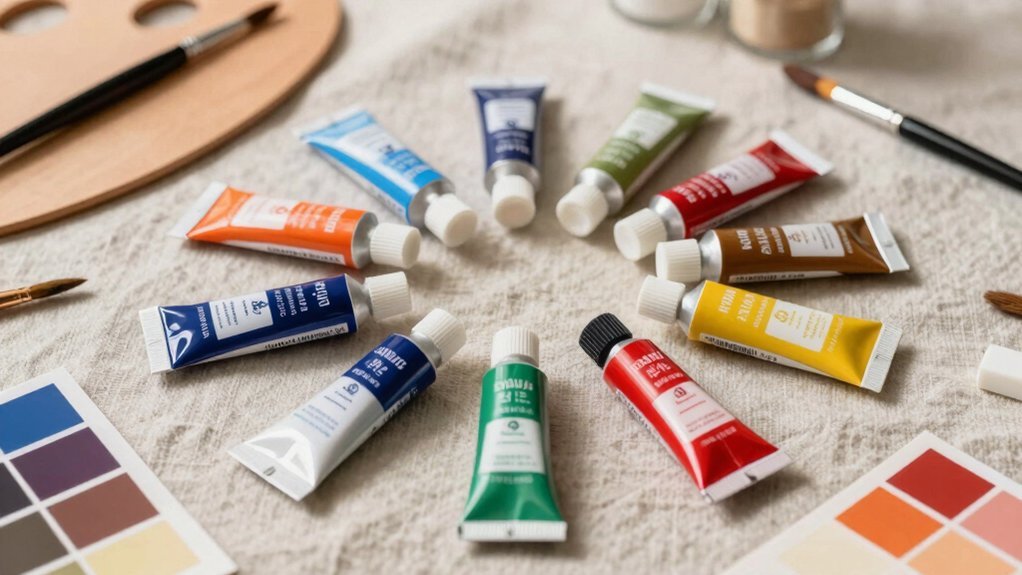


Leave a Reply